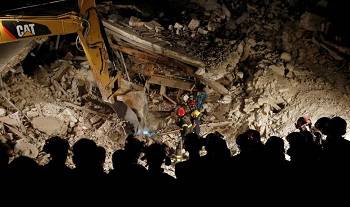The death toll from a devastating earthquake that hit and flattened central Italian towns has soared to more than 240 as rescuers desperately searched through the night for survivors under the ruins of collapsed buildings.
With 368 people injured, some critically, and an unknown number still trapped in mountains of rubble on Thursday morning, the toll was expected to rise further.
Wednesday's pre-dawn earthquake razed homes and buckled roads in a cluster of mountain communities 140km east of Italy's capital, Rome. It was powerful enough to be felt in Bologna to the north and Naples to the south, each more than 200km from the epicenter.
The US Geological Survey said it was a 6.2 magnitude quake that hit near the town of Norcia, in the region of Umbria.
The death toll is 247 as of Thursday morning, the country's civil protection agency said. The toll had stood at 159 on Wednesday night.
Hundreds of people spent a chilly night in hastily assembled tents with the risk of aftershocks making it too risky for them to return home.
"Tonight will be our first nightmare night," said Alessandro Gabrielli, one of hundreds preparing to sleep in tents in fields and parking lots in the small town of Amatrice, each one housing 12 people whose homes had been destroyed.
"Last night, I woke up with a sound that sounded like a bomb," he told the Reuters news agency.
One hotel that collapsed in Amatrice probably had about 70 guests, and only seven bodies had so far been recovered, said the mayor of the town that was one of the worst hit by the earthquake.
"Half the town is gone," Sergio Pirozzi told RAI state television. "There are people under the rubble ... There's been a landslide and a bridge might collapse."
Besides Amatrice, the worst-hit towns were believed to be Accumoli, Posta and Arquata del Tronto, Luca Cari, fire department spokesman, told Reuters news agency, adding that helicopters would be sent up at first light to assess the damage.
Guido Bordo, 69, said that the holiday house of his sister and her husband near Accumoli died under their collapsed holiday house.
"I was not here. As soon as the quake happened, I rushed here. They managed to pull my sister's children out, they're in hospital now," said.
A hostel on the Gran Sasso mountain, a popular area for hikers and climbers, said on its Facebook page that a large piece of rock had collapsed as a result of the tremor.
Gilberto Saccorotti, a geologist at Italy's National Institute for Geophysics and Volcanology, told Al Jazeera: "That particular area has a long history of very [powerful], very energetic seismicity. It's not surprising to have had a [powerful] earthquake there.
"From my knowledge of the area, the roads are very narrow, so if one road fails, the connection may become very difficult ... The depth is quite shallow, about four kilometres. Usually the typical depth is in the order of ten kilometers."
Saccarotti said it was difficult to predict whether there would be another earthquake or more aftershocks.
The last major earthquake to hit Italy struck the central city of L'Aquila in 2009, killing more than 300 people.
PHOTO CAPTION
Rescuers work in the night at a collapsed house following an earthquake in Pescara del Tronto, central Italy, August 24, 2016. REUTERS
Al-Jazeera


 Home
Home Discover Islam
Discover Islam Quran Recitations
Quran Recitations Lectures
Lectures
 Fatwa
Fatwa Articles
Articles Fiqh
Fiqh E-Books
E-Books Boys & Girls
Boys & Girls  Articles
Articles










